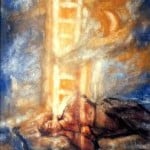Moshe Kempinski

Yaacov ( Jacob) was fleeing from a brother who was set to kill him. He was running away from the only home he knew.He was separating from a father who may have lost some measure of faith and confidence in his son. He was leaving without knowing when he was to return. He is fatigued and drained and he falls asleep on a rock in the middle of the field.
It is then that G-d reveals to him a powerful image:
“And he dreamed, and behold, a ladder set up on the earth, …a ladder set up on the ground and its top reached to heaven; and behold, angels of G-d were ascending and descending upon it. And behold, Hashem was standing over him, and He said, “I am Hashem, the G-d of Abraham your father, and the G-d of Isaac; the land upon which you are lying to you I will give it and to your seed.” ( Genesis 28:12-13)
The G-d continues and declares an even more declarative promise;
“And your seed shall be as the dust of the earth, and you shall gain strength westward and eastward and northward and southward; and through you shall be blessed all the families of the earth and through your seed. And behold, I am with you, and I will guard you wherever you go, and I will restore you to this land, for I will not forsake you until I have done what I have spoken concerning you.”( ibid:14-15)
It is after this that we hear Yaacov making a conditional promise;
“If G-d will be with me, and will keep me in this way that I go, and will give me bread to eat and clothing to wear and I come again to my father’s house in peace; Hashem will be my G-d, and this stone, which I have set up for a pillar, will be G-d’s house; and of all that You give me I will surely give one tenth to You. (ibid 28:20-22)
This is after Hashem adds to the promises that He had already given earlier to Abraham and Yitzchak with a third promise” “And behold, I will be with you, and I will protect you wherever you go and bring you back to this Land…” (28:15).
Shouldnt that expanded promise by G-d be enough to reassure Yaacov ? Why would he seemingly set up these conditions? The Ramban rejects the notion that these were conditions. He teaches that the Hebrew word “Eem” could be read as “when” . This is in keeping with the thoughts taught by Rashi on a verse in Exodus 20:22. There he states that in three situations in the Torah the word “eem” does mean “when” and not if ( Exodus 20:22, Deut. 27:6 ,Exod. 22:24).
Ramban implies that our verses is a fourth example of this usage and the verse would read in this manner;
“When G-d will be with me, and will keep me in this way that I go, ..” That is to say , Yaacov is saying that “at this point in my life I cannot fulfill my desire to create a house for Hashem but when that opportunity will appear , I will.”
Yet most of the other commentators see Yaacov’s statement as indicative of his own insecurity. G-d’s promise is a fact but he, Yaacov feels he may not be worthy of its complete fulfillment . Perhaps the statement of his father Yitzchak still sits heavily on his heart., ” The voice is the voice of Yaacov, but the hands are the hands of Esau.”( Genesis 27:22)
Yet Yaacov then teaches us a great lesson. A lesson which helps to explain why Yaacov and not Avraham and Yitzchak becomes the father of the twelve tribes that become the people of Israel.
We read that after Yaacov’s encounter, “Then Yaacov went on his journey.”The words in Hebrew are, “Va-yisa Yaakov raglav”, which literally means “Yaacov carried his legs”.
That is unusual form of phrasing, as the legs usually carry the rest of the body. Rabbi Chanan Porat Z’l taught that this can be best understood by looking at Rashi’s commentary on the verse. Rashi explains that “his heart carried his legs”.
Yaacov was concerned that he would be unworthy of the tasks before him. He was troubled by the strange world that he was being forced to enter. A world clouded by the unknown. But Yaacov “picked up his legs” and overcame his physical concerns and continued on his way. In many ways Yaacov represents us all.
Throughout this world and especially in this special part of this planet we are surrounded by uncertainty and threats. Here in Israel we are facing the threats of our neighbors and the cold shoulder of our “allies”. We have begun to hear the Palestinian leadership setting up the next conflict and crisis. We have witnessed a steady rise of terrorist stone throwing and Molotov bottle attacks.
Yet the people of Israel continue to move forward with determination. One of the residents of Judea and Samaria was asked on the radio if he and his family were afraid to venture unto the roads. His answer was simple and poignant. He said “ we know we belong here and that this is what we must be doing. So we continue to live our lives.”
They and all of us must continue to learn the art of “Va-yisa Yaakov Raglav-Yaacov carried his legs” to move forward into our destiny.
LeRefuat Yehudit Bat Golda Yocheved
